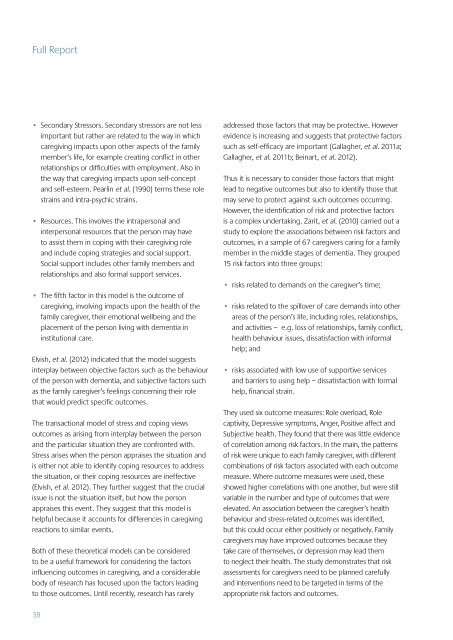The experiences needs and outcomes for carers of people with dementia
RSAS-ADS-Experiences-needs-outcomes-for-carers-of-people-with-dementia-Lit-review-2016
RSAS-ADS-Experiences-needs-outcomes-for-carers-of-people-with-dementia-Lit-review-2016
You also want an ePaper? Increase the reach of your titles
YUMPU automatically turns print PDFs into web optimized ePapers that Google loves.
Full Report<br />
• Secondary Stressors. Secondary stressors are not less<br />
important but rather are related to the way in which<br />
caregiving impacts upon other aspects <strong>of</strong> the family<br />
member’s life, <strong>for</strong> example creating conflict in other<br />
relationships or difficulties <strong>with</strong> employment. Also in<br />
the way that caregiving impacts upon self-concept<br />
<strong>and</strong> self-esteem. Pearlin et al. (1990) terms these role<br />
strains <strong>and</strong> intra-psychic strains.<br />
• Resources. This involves the intrapersonal <strong>and</strong><br />
interpersonal resources that the person may have<br />
to assist them in coping <strong>with</strong> their caregiving role<br />
<strong>and</strong> include coping strategies <strong>and</strong> social support.<br />
Social support includes other family members <strong>and</strong><br />
relationships <strong>and</strong> also <strong>for</strong>mal support services.<br />
• <strong>The</strong> fifth factor in this model is the outcome <strong>of</strong><br />
caregiving, involving impacts upon the health <strong>of</strong> the<br />
family caregiver, their emotional wellbeing <strong>and</strong> the<br />
placement <strong>of</strong> the person living <strong>with</strong> <strong>dementia</strong> in<br />
institutional care.<br />
Elvish, et al. (2012) indicated that the model suggests<br />
interplay between objective factors such as the behaviour<br />
<strong>of</strong> the person <strong>with</strong> <strong>dementia</strong>, <strong>and</strong> subjective factors such<br />
as the family caregiver’s feelings concerning their role<br />
that would predict specific <strong>outcomes</strong>.<br />
<strong>The</strong> transactional model <strong>of</strong> stress <strong>and</strong> coping views<br />
<strong>outcomes</strong> as arising from interplay between the person<br />
<strong>and</strong> the particular situation they are confronted <strong>with</strong>.<br />
Stress arises when the person appraises the situation <strong>and</strong><br />
is either not able to identify coping resources to address<br />
the situation, or their coping resources are ineffective<br />
(Elvish, et al. 2012). <strong>The</strong>y further suggest that the crucial<br />
issue is not the situation itself, but how the person<br />
appraises this event. <strong>The</strong>y suggest that this model is<br />
helpful because it accounts <strong>for</strong> differences in caregiving<br />
reactions to similar events.<br />
Both <strong>of</strong> these theoretical models can be considered<br />
to be a useful framework <strong>for</strong> considering the factors<br />
influencing <strong>outcomes</strong> in caregiving, <strong>and</strong> a considerable<br />
body <strong>of</strong> research has focused upon the factors leading<br />
to those <strong>outcomes</strong>. Until recently, research has rarely<br />
addressed those factors that may be protective. However<br />
evidence is increasing <strong>and</strong> suggests that protective factors<br />
such as self-efficacy are important (Gallagher, et al. 2011a;<br />
Gallagher, et al. 2011b; Beinart, et al. 2012).<br />
Thus it is necessary to consider those factors that might<br />
lead to negative <strong>outcomes</strong> but also to identify those that<br />
may serve to protect against such <strong>outcomes</strong> occurring.<br />
However, the identification <strong>of</strong> risk <strong>and</strong> protective factors<br />
is a complex undertaking. Zarit, et al. (2010) carried out a<br />
study to explore the associations between risk factors <strong>and</strong><br />
<strong>outcomes</strong>, in a sample <strong>of</strong> 67 caregivers caring <strong>for</strong> a family<br />
member in the middle stages <strong>of</strong> <strong>dementia</strong>. <strong>The</strong>y grouped<br />
15 risk factors into three groups:<br />
• risks related to dem<strong>and</strong>s on the caregiver’s time;<br />
• risks related to the spillover <strong>of</strong> care dem<strong>and</strong>s into other<br />
areas <strong>of</strong> the person’s life, including roles, relationships,<br />
<strong>and</strong> activities – e.g. loss <strong>of</strong> relationships, family conflict,<br />
health behaviour issues, dissatisfaction <strong>with</strong> in<strong>for</strong>mal<br />
help; <strong>and</strong><br />
• risks associated <strong>with</strong> low use <strong>of</strong> supportive services<br />
<strong>and</strong> barriers to using help – dissatisfaction <strong>with</strong> <strong>for</strong>mal<br />
help, financial strain.<br />
<strong>The</strong>y used six outcome measures: Role overload, Role<br />
captivity, Depressive symptoms, Anger, Positive affect <strong>and</strong><br />
Subjective health. <strong>The</strong>y found that there was little evidence<br />
<strong>of</strong> correlation among risk factors. In the main, the patterns<br />
<strong>of</strong> risk were unique to each family caregiver, <strong>with</strong> different<br />
combinations <strong>of</strong> risk factors associated <strong>with</strong> each outcome<br />
measure. Where outcome measures were used, these<br />
showed higher correlations <strong>with</strong> one another, but were still<br />
variable in the number <strong>and</strong> type <strong>of</strong> <strong>outcomes</strong> that were<br />
elevated. An association between the caregiver’s health<br />
behaviour <strong>and</strong> stress-related <strong>outcomes</strong> was identified,<br />
but this could occur either positively or negatively. Family<br />
caregivers may have improved <strong>outcomes</strong> because they<br />
take care <strong>of</strong> themselves, or depression may lead them<br />
to neglect their health. <strong>The</strong> study demonstrates that risk<br />
assessments <strong>for</strong> caregivers need to be planned carefully<br />
<strong>and</strong> interventions need to be targeted in terms <strong>of</strong> the<br />
appropriate risk factors <strong>and</strong> <strong>outcomes</strong>.<br />
38


